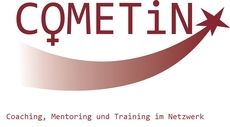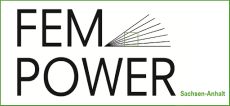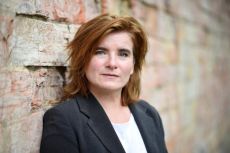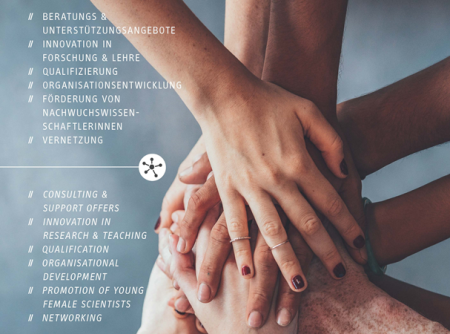Newsletter June 2020
Latest News | |
 | Save your place now at COMETiN, the mentoring program for young female scientists at OVGU!
Then register for the next round of the COMETiN program. Here you will receive personal exchange with a mentor, workshops and coaching to support you on your way. The new round starts on October 27th, apply now at http://www.bfg.ovgu.de/COMETiN+Programm/Teilnahme.html |
 | Staged city centre: open space laboratory in Magdeburg Since June 12, 2020, the open space laboratory in the northern section of the Breite Weg in Magdeburg has been open and invites visitors to a creative-experimental discovery tour. Until July 12, 2020, the city centre can not only be experienced in a new way, but also actively shaped - from gastronomy and design to the open stage. Visitors can expect exhibitions, children's entertainment, art actions, an open stage, a city beach and workshops. For more than four weeks, Magdeburg's creative people, artists and cultural workers will revive the Breite Weg in this way during the open space laboratory and make art tangible for passers-by. Further information, short-term actions as well as image and video impressions can be followed on the social media channels of the Open Space Laboratory on Facebook and Instagram. The programme overview and further information can be found here. |
 | Changes to the Wissenschaftszeitvertagsgesetz Shortly before the Whitsun weekend, as already announced by the Federal Minister at the beginning of April 2020, the Science Temporary Contract Act was amended by the Act of 25 May 2020. The amendment concerns Section 7 of the Act, which provides a transitional arrangement for the consequences of the corona pandemic. With the amendment of the Act, the maximum time limit for fixed-term contracts concluded for qualification purposes has been extended by 6 months. Similar to the already known child component, this extends the time that can be used for qualification. This regulation does not apply to employees receiving third-party funding because there are no legally defined maximum limits for third-party funding. You can find the prerequisites for extending the maximum time limit and detailed explanations here. Further explanations can be found on the BMBF website at https://www.bmbf.de/de/faq-was-befristet-beschaeftigte-jetzt-wissen-muessen-11682.html |
 | Diversity without inclusion does not work | #WakeUpCall with Prof. Dr. Susanne Schmidt How are diversity and inclusion related? How has the Corona crisis influenced teaching and research? Does the crisis lead to regression on the issue of equality or is it rather a wake-up call for our economy, society and politics? Prof. Dr. Susanne Schmidt, Professor for International Management at the Otto-von-Guericke University Magdeburg, will address these questions in a wake-up call. Researchers agree on one point in particular: "Companies that invest in diversity and inclusion are more innovative in the long term and can operate more successfully on the market in the long term," says Susanne Schmidt. You can find the Wake-Up Call video here |
 | "We should refuse to function so well!" In recent weeks, the FEM POWER network has collected statements from women in the scientific community in order to make their experiences during the Corona period visible - for example from gender researcher Dr. Lena Eckert of the University of Halle, who says: "We should refuse to function so well! The contributions and analyses collected under the hashtag #FEMPOWERING make it clear: Equal opportunities in science and in society as a whole are a long way off. You can read the contributions on the campaign website and Facebook page of the Coordination Office for Gender Research & Equal Opportunities Saxony-Anhalt. |
Grants and Prizes | |
 | Coaching offers for young female scientists at the OVGU The Office for Gender Equality offers young female OVGU researchers (doctoral candidates and post docs) the opportunity to take advantage of individual professional one-to-one coaching. Coaching is a professional consultation with the goal of implementing professional concerns. Coaching supports processes of self-reflection in order to recognize and solve problems (Deutscher Bundesverband Coaching e.V.). If you are interested, please contact the team of the Office for Gender Equality. Please also visit the website of the Office for Gender Equality for information on registration. |
 | Course offers for the 12th meccanica feminale 2021 wanted: Deadline for submission 28.07.2020 The 12th spring university meccanica feminale (#mfbw21) for students of all engineering sciences, especially mechanical engineering, electrical engineering, medical technology and industrial engineering and management, will take place from 16.02. - 20.02.2021 at the University of Stuttgart, Campus Vaihingen. Lecturers and working female engineers are cordially invited to submit offers for seminars, workshops and lectures. We also ask you to pass on this information! We are also looking for lectures for the Conference Day on February 18, 2021 (duration of lectures: 45 minutes). The deadline for the Call for Lectures is 28.07.2020. The main topic of meccanica feminale 2021 is aerospace technology. Suggestions for other topics are of course also welcome. To the complete Call for Lectures |
| Announcement of the Otto von Guericke Scholarship 2020 for the promotion of foreign students The state capital Magdeburg and the Otto von Guericke University Magdeburg will award the Otto von Guericke Scholarship for the 18th time in 2020. The scholarship includes an endowment of 6.000 € from the state capital Magdeburg and the targeted support of one foreign student (no doctoral student) of the Otto-von-Guericke-University Magdeburg in the academic year 2020/21. All scholars of the OVGU have the right to nominate. Foreign students of the OVGU can also apply for the scholarship themselves. Proposals and applications can be submitted until August 6, 2020. more | |
| DAAD Prize 2020 for outstanding achievements by foreign students The DAAD prize is intended to honour a student of the OVGU with special academic achievements and remarkable social or intercultural commitment. Candidates (only foreign students, no guest or exchange students) should generally be in an advanced stage of their Bachelor's (at least 2nd or 3rd academic year) or Master's degree (at least 2nd semester). However, young graduates and doctoral candidates can also be named. The DAAD Prize is not a research prize and is not intended to honour a doctoral thesis. The DAAD Prize is primarily intended for students/graduates who have successfully completed their studies under their own steam. The prize money is 1000,- Euro. The prize cannot be divided among several students. Please nominate a suitable candidate and send us a detailed statement of reasons by 6 August 2020. To the complete announcement. to the complete announcement | |
| Call for Papers: Yearbook Educational Gender Studies Vol. 18/2022 Family, gender and education - in times of crisis in the 21st century For the majority of children and young people, the family is the primary place of upbringing, education and socialisation. The increase in the female employment rate, the legal equality of the sexes in marriage and the family, the moral legitimisation of male interest in family time, but also the increasing social acceptance and visibility of post-modern family life forms (such as same-sex or queer parenthood, various patchwork constellations, active single parenthood, project-based forms of living together in nuclear families or across generations, families living at a regional/international distance, etc.) have created many opportunities to adapt private life more closely to individual needs, even 'beyond the gender trap'. In spite of all these changes and the increase in the number of possibilities for shaping the future, reproductive and care work, and thus in particular educational tasks along the lines of the historical bourgeois family model, continue to be a priority task for women in the 21st century. Women in unequal social situations - and thus also in the global context - are affected equally, albeit to different degrees. Against this background, social crises that change and/or limit the socio-structural and discursive framework conditions under which families shape educational processes currently appear particularly interesting. The corona pandemic and the social, economic and labour policy crisis it has triggered has proved to be a burning glass under which the relationship between family, gender and education is shifting once again - the re-traditionalisation of gender relations and the reproduction of unequal educational opportunities are just two of the most serious trends in this development (cf. also the statement of the Women's and Gender Studies Section in DGfE 2020). Taking these and other crises as its starting point, the 18th volume of the Yearbook of Gender Studies in Educational Science is thus dedicated to the question of how families of the most diverse constellations deal with educational challenges under crisis-like conditions and how gender and gender difference are used or constructed and differentiations made. In addition to this thematic focus, the Yearbook Educational Gender Studies 2022 (Volume 18, Barbara Budrich Publishers) will contain a limited section for open contributions. These can take up the topic of the volume in a broader context or be thematically independent. Contributions are requested that argue explicitly from an educational science and gender-theoretical perspective or that focus on gender and education. The contributions may be of an empirical, theoretical or methodological nature. We also welcome reviews and collective reviews of publications from various contexts of educational gender studies, which preferably, but not exclusively, deal with the focus of this volume. Both for the contributions to the main topic and for the open part, an exposé (max. 3,000 characters) is requested by 15.09.2020. You can find the complete call here | |
Events | |
 | Top managers - Portraits of women in leadership positions - Online reading with Marie-Luise Braun on 02 July 2020 Top people! Women achieve a lot - and rarely lead. But how do they manage to get into the lead and fill such a position? What supports them? How do you deal with obstacles? And how do you reconcile career and family? The book "Spitzenkräfte. Porträts von Frauen in Führungspositionen" by Marie-Luise Braun. Thirteen impressive personalities report on their way to the management level. The book thus closes a gap, because many women lack professional role models - especially in management positions. "Spitzenkräfte" presents women from different levels of leadership in politics, the start-up scene, consulting, crafts, culture, business and science. Among them are Prof. Dr. Antje Boetius (Director of the Alfred Wegener Institute), Hiltrud Werner (Director of VW), Dr. Ellen Ueberschär (Director of the Böll Foundation) and Dr. Julia Verlinden (Member of Parliament for Bündnis 90/Die Grünen). The book ends with an essence that provides inspiration for one's own actions. Further information on the online reading can be found here here The live streaming will be shown here: https://www.youtube.com/user/LagerhalleOsnabrueck |
| Become capable of action! Sexism and anti-feminism contradict - Online workshop on 10 July 2020 At the family reunion, in the carpool or in the pub with the buddies - again and again one encounters sexist remarks or is even confronted with anti-feminist positions: "You can't even pay a compliment to women anymore", "Equality? "Gender Studies wants to sexualise our children at an early age!" But when is a clear edge, when are substantive arguments and when is an understanding exchange needed? How do I react as a person affected and how do I react as the person on the right? This interactive webinar, which lasts several hours, offers the opportunity to exchange information about strategies for action against sexist and anti-feminist positions and to try them out practically in the online workshop. The workshop is open to all genders. more | |
| "It's not too late to say..." Recognizing discrimination and showing attitude - Workshop from 11 - 12 July 2020 To position and act against discrimination in times of growing right-wing populism. How are current forms of discrimination shaped? What is my role in this? And how can I oppose and argue? What is "allowed" to be said in public has shifted far to the right in recent years. In our private and professional environment we are confronted with right-wing populist, racist or other discriminatory statements and patterns of thought. In order to gain more certainty about what can and cannot be discriminatory, the workshop will deal with different forms of discrimination and their effects. In addition, own experiences of discrimination as well as own discriminatory behaviour will be reflected upon. Furthermore, different right-wing populist statements and argumentation patterns, the strengthening of one's own attitude and the development of discussion strategies will be dealt with. With whom do I want to discuss, what attitude do I take and when do I decide on other strategies for action? Various discussion situations are simulated in order to train and strengthen one's own argumentation skills. This workshop enables you to recognise discrimination in everyday life, to develop lines of action and argumentation and thus strengthens your own clarity and ability to act. more | |
| Rejecting Antifeminism - Webinar on how to deal with attacks on equality and gender, sexual and family diversity on 18 July 2020 Amnesty International's study "toxic twitter" shows that about one third of all women on the net experience gender-specific attacks. This is also the case for many other people who are visible online with a transgender identity or homosexual orientation. But equality policies and institutions are also under fire on the Internet, especially in social media. The webinar is aimed at those who want to defend themselves against anti-feminist statements in the online context. An overview of the field of antifeminism and the consequences for those affected will be given. The ways of reacting to it are individual and situation-specific. Together and on the basis of practical examples, we will work out how you can act in online situations yourself: e.g. discuss, position, advertise, or do something completely different. In addition, a series of conversation strategies will be presented which you can try out right away. more | |
| For women: Identifying and strengthening successful communication patterns from 21.09.2020 to 22.09.2020 in Cologne Women are excellent communicators - they communicate sensitively, vividly, create connections and are often good listeners. But of course they can also be fact-oriented, objective and confrontational. Recognizing and developing strengths is the goal of this training. The seminar shows successful communication patterns and perfects them.
This seminar, which is strongly practice-oriented, gains in sustainability by dealing with the concerns/ examples/ questions of the participants. More information on the programme and registration can be found here | |
University and Politics | |
 | Kris Adlitz: Why does gender inequality persist? How can the current gender relations in Germany be explained? This book attempts a comprehensive and fundamental critique of the interrelationships - from gender assignment to wage and pension differences, from the promise of happiness in love to bedtime conversations to sexual abuse, from the problem of compatibility to sexist jokes to the LGBTI movement. The usual ways of thinking are problematised: Neither role ascriptions nor the biology of biparental reproduction, the cultural order of bisexuality or patriarchy can meaningfully determine the development of gender relations. Only a critique of bourgeois forms of rule can explain why gender culture has changed and why gender inequality in Germany remains. more about the book |
| Right of temporary residence. What professors tell about their educational advancement The French colleagues have demonstrated that, following Pierre Bourdieu's sociological self-experiment (2002) and Didier Eribon's return tu Reims (2016), it is possible to narrate what has so far been shamefacedly concealed or dismissed as irrelevant for the path to university: a social background that is far removed from education. However, voices of women, with the exception of Annie Ernaux (e.g. Die Jahre (2019), Erinnerungen eines Mädchens (2020)), are rarely heard in the discourse. The book Vom Arbeiterkind zur Professur by Julia Reuter, Christina Möller, Markus Gamper and Frerk Blome adds authentic perspectives from the German educational landscape and allows a relatively large number of female professors to have their say, including those who have been and still are formative for German-language gender studies. more | |
| Promotion of women in computer science between empowerment and stereotype reproduction Computer science lacks women - this has been the starting point of the research field "Women in Computer Science" for years. But is it really that simple: more women = better computer science? Are support measures that target women as a homogeneous, biologically determined group really suitable for bringing about lasting changes in computer science? more | |
| Learning from Corona: reducing gender inequality In the Corona crisis, there is a threat of considerable regression in gender equality. For the political measures for dealing with the virus neglect the realities of life for women and girls and rely on gender roles that were believed to be outdated long ago. To ensure that our society emerges from this crisis more justly and sensitised than it has been, DF is calling for far-reaching changes in economic, financial and social policy. The aim is a social paradigm shift that places people, not markets, at the centre of political action. A new series of texts entitled "Gender justice out of the crisis" describes what the largest women's lobby believes must be done to achieve this. Part 1 starts with fundamental considerations and demands for a gender-equitable crisis policy: fair distribution of financial aid, equal participation in political decision-making and a forward-looking equality strategy. The series of texts "Gender Equitable Out of the Crisis" can now be followed on the website of the Women's Council at www.frauenrat.de/corona. | |
| Work Programme of the German Council of Science and Humanities January - July 2020: Recommendations for the Further Development of Gender Studies in Germany The German Council of Science and Humanities is currently preparing recommendations for the further development of gender studies in Germany (including a review of the current situation). The recommendation should be completed in the second half of 2020. Excerpt - Work Programme p. 24/25: "Gender Studies, which have established themselves in the German academic system over the past decades, are characterized by a broad disciplinary and thematic range and are represented at numerous universities and non-university institutions. So far, there is no inventory that provides information on the structure, the scientific quality of research and teaching, the national and international networking and the transfer achievements of this research field. In agreement with the other federal states, the Free and Hanseatic City of Hamburg asked the Science Council in a letter dated 26 November 2019 for a comprehensive evaluation of gender studies, taking into account all relevant institutions in Germany. This structural evaluation is to cover both research and teaching at universities and non-university research (including departmental research) and examine the overall situation of Gender Studies in Germany. On this basis, it will also show how this field of research should be further developed in Germany and how universities, research institutions and science policy at federal and state level can contribute to this further development. The Council of Science and Humanities will set up a working group to carry out this structural review, which is expected to begin its deliberations in the second half of 2020. The aim is to present the draft recommendation in the second half of 2022." to the work programme | |
| Beyond symbolic recognition: Reshaping working and gender relations Nurses and geriatric nurses, but also supermarket cashiers are experiencing both the unusual and the familiar these days: What is new is the media attention paid to their performance and the way it is addressed in society, and what is known is the continuing low monetary gratification. Their activity is described as systemically relevant, which is supposed to mean that their gainful employment is a supporting pillar of society. However, the far too low level of collective bargaining in the social economy in Austria in the course of the Corona pandemic and the fact that supermarket cashiers are sometimes fobbed off with symbolic bonuses, contrary to the publicity claims of the food industry. more | |
 Thank you very much for your interest! You are welcome to forward the newsletter. To register, please send a message to gleichstellungsbeauftragte@ovgu.deor register on the Website. |

